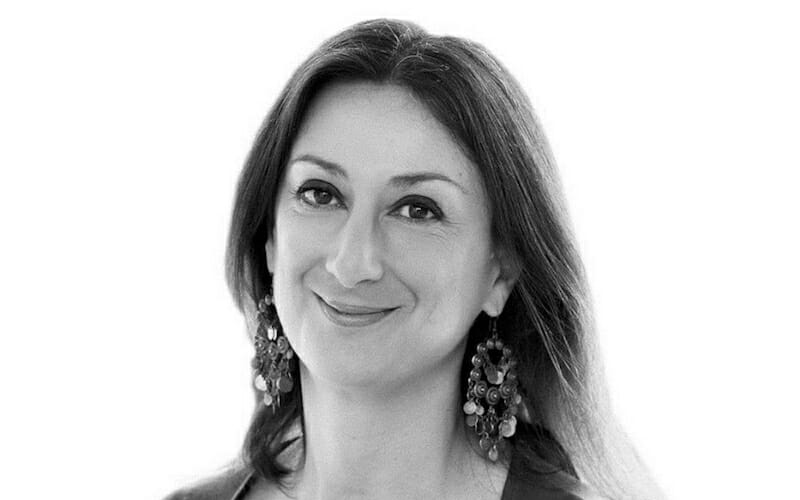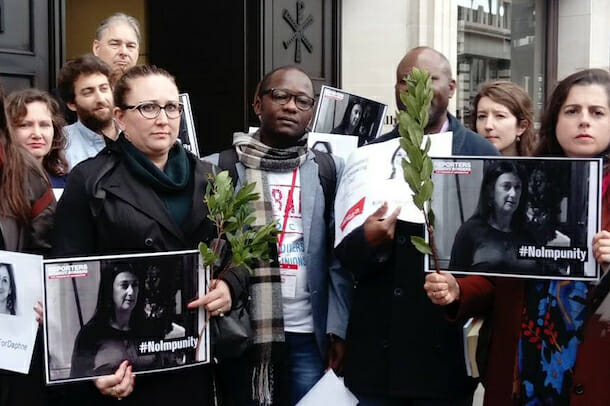
In the Murder of Daphne Caruana Galizia, We Should Expect More of Europe
Supporters of the murdered Maltese journalist and blogger, Daphne Caruana Galizia, suffered a double blow in recent weeks, as her source Maria Efimova surrendered to a European Arrest Warrant in Greece and the Council of Europe declined to take any further action over the murder.
Galizia, a prolific blogger and investigative journalist was killed on October 16, 2017. An explosive device was placed near a road and detonated remotely as she drove past, according to police reports, the detonation signal having originated from a point at sea.
Galizia had published exposes about Prime Minister Joseph Muscat’s connections to the Panama Papers scandal, including the claim that Muscat and his wife had allowed the registration of the private Pilatus Bank, through which they had assisted the daughter of Azerbaijani President Ilham Aliyev to move over £1m to offshore accounts. These exposes led to harsh criticism from members of the European Parliament and ultimately forced Muscat to call early elections in June, 2017.
Three Maltese men have been charged with her murder although few believe that they acted without direction from a third party. Galizia’s widower has made it clear that he believes that the mastermind behind the attack is being protected from within the Maltese government, saying in a statement: “It is clear to us that the three men arraigned so far are simply contractors commissioned by a third party. My sons and I are not convinced that our government really wants to establish who sent them, for fear such persons are in fact very close to our government. For this reason we may never know the truth.”
Prime Minister Muscat issued a statement describing the murder as a “…barbaric attack on a person and on the freedom of expression in our country,” although in an interview with the BBC on January 8th 2018, Muscat acknowledged that “Her murder doesn’t look good on me…”
Despite these concerns, the Council of Europe’s Committee of Ministers issued a statement on April 3, 2018, indicating that they were confident that the Maltese authorities “…will continue to make appropriate use of all the means and mechanisms in place both in the Council of Europe and at domestic level and in full respect with the fundamental values and standards of the Council of Europe” and that the Council itself did not intend to take any further action.

This announcement was met with dismay from supporters of Galizia, including her sons, who said in a statement that the ruling : “… is not cause for celebration by government officials, especially when that reply is based on open deceit. There is no such thing as ‘judicial investigations’ in Malta and there can be no judicial prosecution. Neither are any sort of investigations whatsoever open into any of Daphne Caruana Galizia’s reporting, with the one exception of a magistrate seeking to pin down a declaration of trust showing that Michelle Muscat is the beneficial owner of Egrant Inc, evidence which was clearly spirited out of the country over a year ago. That the police are not investigating any of this is unprecedented in Maltese history and a scandal in itself, now that our mother, Daphne Caruana Galizia, the person who first reported on this, has been executed before our eyes.”
In the meantime a European Arrest Warrant was issued for Maria Efimova, Galizia’s source within Pilatus bank. The warrant alleged that Efimova had made false claims against police officers, allegations described by Greek MEP Stelios Koulgolou as “ridiculous.”
Efimova, who believes that her identity as the whistleblower had been leaked to the press by a Maltese judge, surrendered to the warrant on March 20, 2018, telling friends that she feared for her life. A group of MEPs from all political parties has issued a call for Greece to protect Efimova, describing the charges against her as “frivolous,” and a Greek court has thus far refused her extradition, but Greek prosecutors are in the process of appealing this ruling.
Surrounded on all sides by unprecedented infringements on press freedoms, from the state-controlled media of China and Russia, through intimidation and violence throughout the Middle East and Africa, we look to Europe as the last bastion of a free press.
With both the Council of Europe refusing to investigate Galizia’s sacrifice and the European Union failing to protect her source, it seems that even this last bastion is falling.

